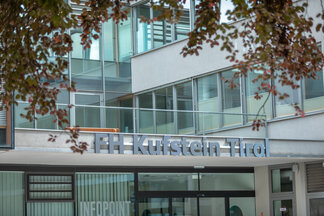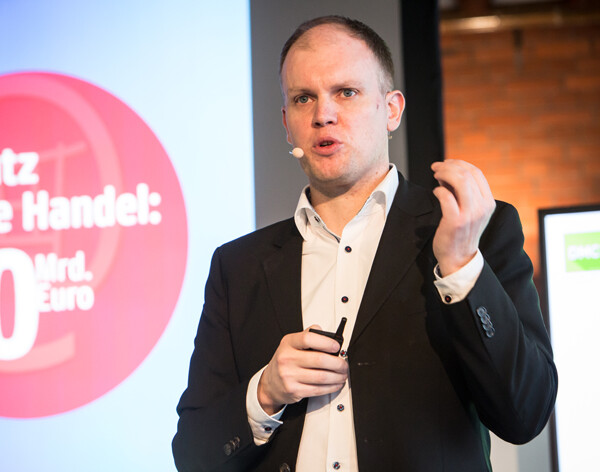Our full-time master's in Digital Marketing emphasizes developing expertise at the intersection of marketing, creativity, and web technology, while also incorporating social skills and leadership training. It’s your career springboard to the future of marketing!

Digital Marketing
Master's degree program
Overview
-
Qualification Level:
Stufe 2, Master -
Price:
Euro 363,36* (excl. Student Union-fees) each semester -
Academic Degree:
Master of Arts in Business (MA) -
Academic Program:
Full-time -
Language:
79% German, 21% English -
Remote Options:
E-Learning max. 30 % online -
Exchange Semester:
Supervised one-week study trip in the 3rd semester** -
Admission Requirements:
General admission requirements -
Study Places per Year:
20
Program Description



Conquer the digital world with our on-the-job master's program in Digital Marketing at FH Kufstein Tirol. Innovative topics such as omnichannel strategies and generative AI will equip you for leadership roles in the future of marketing.
This program focuses on developing skills in digital marketing management, media, and the latest communication technologies. Students learn to create user-centered, cross-media content, with generative AI playing a key role. Hands-on projects and personalized electives prepare graduates for leadership positions in the marketing and communications industry. The blend of subject matter expertise, social skills, and project management skills makes them highly sought-after experts in the digital world.
Study Focus
-
21 %
Digital marketing expertise
-
11 %
Economics incl. Management
-
11 %
Technologies of web-based systems
-
26 %
Subject-specific specializations & electives
-
31 %
Practice transfer & Master's thesis
What You Will Learn
-
Designing and adapting digital campaigns
-
Identifying current technologies and trends
-
Analysing key figures relevant to the online sector
-
Creating content for websites, branding and customer engagement
-
Developing and implementing concepts and strategies for the defined target group
-
Recognizing and analyzing customer requirements
-
Planning, designing and implementing social media projects
-
Strategic use of social media
Popular Occupational Fields
- Marketing & Communications Manager
- Social Media Manager
- Customer Experience Manager
- Media and communication consultant
- SEO/SEA Manager
Career Opportunities
-
EUR 1,749 million share
digital advertising in 2024; robust market (according to Statista)
-
6,45 %
annual growth in 2024 (according to Statista)
-
excellent job opportunities
The path to the Master's degree

Part-time master’s degree: The first year covers digital fundamentals in marketing, web, and social media. As you progress, you'll dive deeper into cross-media design and omnichannel marketing. Knowledge is applied through practical projects, and the final master’s thesis gives you the opportunity to explore specialized topics of your choice.
Special features:
-
Study trip (Amsterdam, Helsinki, Dublin, etc.)
-
Management Forum Kufstein: Live talks with entrepreneurs
-
Project collaboration with companies and guided practical projects for hands-on experience
Recognition of Prior Learning
Students have the option to receive credit for skills and competencies they have already acquired before the start of each semester.
To apply for credit, they must submit a request directly to the Director of Studies.
Director of Studies

Prof. (FH) Dr. Wolfgang Reitberger
Director of Studies Bachelor Marketing & Communication Management, Master Digital Marketing
Curriculum
Digital Marketing
Content Marketing
- Semester 1
- 4 ECTS
The course is dedicated to the creation of content with the goal of strategic usage of target group-appropriate content in marketing. The functionalization and application of aesthetics in the area of marketing is analyzed as a foundation and critically reflected against the background of necessary diversification processes for marketing strategies (keyword “brand identity”) within the course of the “economics of attention” and the particularities of “prosumentation” (according to Töffler’s term “prosumer”) in the digital age.
DetailsAffiliate Marketing
- Semester 1
- 2 ECTS
The course conveys knowledge of the principles and structures of affiliate marketing. Available tracking methods and their limitations (both from a technical and legal perspective) are addressed within the context of portraying cooperating participants and functional principles. Various provision models and advertising formats of affiliate marketing and their usage scenarios are discussed in detail. Furthermore, affiliate networks as mediators between involved parties and practical examples for the system of marketers, sales partners and customers are analyzed. In conclusion, business models are highlighted, building on affiliate approaches (e.g. white or grey label partnerships).
DetailsDigital Marketing I: Strategy Development & Planning
- Semester 1
- 5 ECTS
Within the context of the fundamental course at the master level, students independently review previously acquired marketing fundamentals while the challenges of marketing communication in digital media are introduced subsequently. Central course content includes the following areas: - Situational analysis - Target definition - Target group analysis - Targeting - Briefing for agencies - Message development - Media selection (classic/digital, BTL/ATL) - Media planning
DetailsDigital Dialog Marketing
- Semester 1
- 5 ECTS
The course provides an overview of the media of digital dialog marketing, its possibilities, framework conditions and risks, discusses differences with respect to classic dialog marketing and addresses the particularities of social, mobile and direct marketing. E-mail marketing is another focal point. In addition to theoretical input, implementation in marketing practices is also analyzed based on case examples. Students gain practically relevant experience in the usage of digital dialog marketing through exercises. The course provides the foundation for the consolidation “Social Media I & II”.
DetailsCustomer Experience Management
- Semester 1
- 5 ECTS
The course provides an overview of customer experience management and of the constitutive blocks of customer satisfaction and customer loyalty. These are illuminated within the context of increasingly complex customer journeys and changing consumer behavior on the web. Specifically strategies and application options of CRM for customer loyalty, fundamentals of web mining, approaches for analyzing large data volumes (big data), options for addressing target groups via targeting as well as aspects of tracking user activities are discussed. Various approaches and testing procedures for optimizing usability and thereby increasing positive customer experiences are introduced. The focus is on support options along the customer journey and linking the increasing number of customer contact points (touchpoints). Specifically communications and marketing instruments, made possible by digital media and instruments are addressed – e.g. aspects of viral marketing/digital word-of-mouth advertising via social media.
DetailsPerformance Marketing
- Semester 2
- 5 ECTS
The course conveys the fundamentals of performance marketing: The focus is on providing an overview of central approaches and their effective mechanisms as well as on conveying essential key parameters and their correct interpretation. Search engine marketing with its subitems SEO and SEA is emphasized. Students are instructed in developing independent and promising strategies. Analysis, strategic orientation, operational realization and implementation as well as the control of respective activities are further central aspects.
DetailsCrossmedia-Production & Digital Design I
- Semester 2
- 6 ECTS
At the beginning of the course, an introduction to crossmedia content production is given (content development, format development, crossmediality, convergence and crossmedia added value among others). Building on the course Fundamentals of the Web (Semester 1), conception and implementation of web presences is taught in theory and practice whereby the following topics are addressed more specifically: - Web and screen design - Usability - Design of interactive media - Advanced website programing with emphasis on HTML5 (or subsequent standards), WYSIWYG editor of Adobe CS (current version), integration of various media formats, netcasting & blogging software, further topics: CMS, Javascript & Ajax
DetailsSocial Media I
- Semester 2
- 6 ECTS
The development history and characteristics of networks and social media for everyday usage in the private and professional sphere are depicted – from discussion forums and virtual organizational forms to crowdsourcing and user generated content. In addition to company networks and the visualization of added value, blogs, microblogs (Twitter) and social networks are further focal points. These are systematically introduced and examined based on their usability in companies and for communications between organizations and consumers. Aspects of mobile social marketing and social commerce are also developed in this context.
DetailsEthics in Marketing
- Semester 3
- 2 ECTS
Following a brief introduction of the historic development and current understanding of ethics in (Western) society and an overview of involved institutions, the seminar deals with current trends and tendencies. Sustainable marketing management includes corporate social responsibility (CSR), corporate cultural responsibility and ecological areas (example green event) and engagement with consumer ethics. Against the background of the globalization of markets and demographic restructuring of worldwide societies, transcultural and multicultural correlations play an important role for sustainable and ethically oriented marketing. The seminar especially focuses on the international model formation of ethics in marketing and role models for responsible present-day and future companies. Furthermore, effects of the technological transformation on the relationship between family and university are discussed.
DetailsSocial Media II
- Semester 3
- 6 ECTS
Building on the course “Social Media I”, this course is focused on consolidating the applicability of social media instruments and channels. Fundamental theoretical approaches and methods for acquiring network data and various analysis procedures are conveyed. Data from the first course is reviewed and evaluated via software tools. Based on these activities, fundamental analysis options in social networks and possible conclusions are discussed. The following questions are at the core of the matter: How can interactions in social networks such as LinkedIn, Facebook and Instagram be evaluated, visualized and used and which conclusions can be drawn from it. Building on analyses, central elements for the development of (social media) strategies for applications in companies and on consumer markets are introduced.
DetailsDigital Marketing II: Budgeting & Controlling
- Semester 3
- 4 ECTS
Within the context of the course, various areas of controlling (basic knowledge in the area of accounting and controlling is assumed) are addressed with special focus on relevant themes of digital marketing. After completing the course, students possess the following abilities: - Determining the goals of digital marketing measures - Acquiring, analyzing and interpreting the market potential of digital marketing measures - Determining and managing a marketing budget for digital marketing measures - Measuring and interpreting the success of a digital marketing campaign - Deriving recommendations for action - Creating a final report
DetailsCrossmedia-Production & Digital Design II
- Semester 3
- 6 ECTS
The second part of the module focuses on the conception and production of audiovisual media. Central topics of the course include: - Characteristics and application areas of audiovisual media - Design of time-based media - Narration and narration techniques - Scientific work - Sound and image design The following topics are addressed in exercises: - Video technology (standards such as HD, SD, equipment) - Video production (pre-production, post-production & production) - Audio technology (microphoning, standards, equipment) - Audio production (recording, processing, editing, export) Students synthesize knowledge and abilities from both module parts within the context of project work.
DetailsDigital Marketing III: Omnichannel Marketing Communications
- Semester 4
- 3 ECTS
Building on knowledge acquired in the previous three semesters, the usage of digital channels for market research/analytics, development, implementation and adaptation of entrepreneurial strategies as well as for the effect of intra-organizational measures are understood and applied based on case examples selected by the teaching staff. Students develop an omnichannel marketing communications strategy through project work in which all content of digital marketing modules is integrated.
Detailsinternational competence
Study Trip
- Semester 3
- 3 ECTS
The study trip affords students the opportunity to acquire intercultural skills. Under the instruction of course leadership, students learn about potential study trip destinations, research relevant data and facts about the target country and organize the program independently: Students spend a week in an international environment as they visit companies and attend lectures at partner universities while also taking in other presentations and events, which ensures that students acquire an understanding of the main cultural currents of the respective country. Discussions with specialists and executives, visits to foreign trade centers as well as economic and social associations complement the international, character-building experience of the study trip.
DetailsManagement
Fundamentals of Digital Economics
- Semester 1
- 2 ECTS
The course illuminates fundamental aspects of the digital economy. After explaining the particularities of digital goods, electronic markets and added value in the Internet economy, the following topics are addressed in depth: - Methodological fundamentals, application of networked thinking and acting - Effects on private persons and companies (network effects, economy of searching and finding, trust aspects) - Total economic effects (market transparency, globalization of added value, hyper-competition) - Business models in the digital economy (specifically in the area of e-commerce/m-commerce) In the area of marketing, the emphasis is on new forms of cooperation and participation, which are enabled by the digital economy (social shopping, viral, mobile, online marketing among others) and the resulting adjustments for entrepreneurial business models. Aspects of the change from stationary to mobile and ubiquitously available applications are also discussed. In the technical area, infrastructures for e-business (middleware, safety aspects, technologies for project searching and product representation in the digital environment), technologies, platforms and standards in the area of e-commerce (EDI, etc.) as well as advantages and disadvantages compared to stationary trading are discussed.
DetailsTeambuilding
- Semester 1
- 1 ECTS
Under the supervision of teachers, students as a group are introduced to the new context of university education at the master level. Furthermore, students learn to better understand interpersonal communication processes as they become aware of expectations and conditions and make these more transparent within the new context while also learning to work more efficiently.
DetailsEnglish version available soon
- Semester 2
- 2 ECTS
The content comprises the following legal fields within the context of the web: private and public law, competition law and criminal law. Specifically procedures for identity and authenticity safeguarding, electronic signatures, data protection and e-commerce (international purchasing law, jurisdiction and enforcement questions) are addressed. The legal foundations of competition law, patent law and advertising on the Internet are also discussed in an international comparison.
DetailsOrganisational Theory & Strategic Management (E)
- Semester 2
- 4 ECTS
The English-language course provides an initial introduction to classic organizational theories. Subsequently, symbolic theories and review concepts (reframing, organizational metaphors, reframing organizations) as well as various approaches are discussed. For the latter, the focus is on the following: - Behavioral-theoretical approaches - System-theoretical approaches - Situational approaches As a complement to topics of organizational theory, strategy fields in organization, marketing, competition, creativity and innovation are addressed in depth in the area of strategic management as well as the schools of strategic management according to Mintzberg (design, positioning, entrepreneur, planning, cultural, learning, environmental, cognitive, power and configuration schools). Finally, the instruments of strategic management (Five Forces, BCG matrix, SWOT, stakeholder matrix, ...) are introduced in detail.
DetailsPractice transfer & empiricism
Scientific work
- Semester 2
- 4 ECTS
Students gain consolidating knowledge in the area of scientific work and are able to develop complex scientific questions as well as create and check research designs, which implies an advanced level of structure and content as well as of form and language. The practical development of the aforementioned knowledge prepares students both formally and methodologically for the writing of a master thesis – exposition and critical questioning of the scientific methodology of the master thesis are also taken into account. Possible topics and hypotheses are discussed in order to support students in their search for relevant and highly qualitative research areas.
DetailsElective I(E)
- Semester 3
- 3 ECTS
The course will focus on the following points: - Future of sport, culture and events in terms of importance - The use of marketing tools in projects - Scientific analysis of marketing campaigns in practice - Current trends in international business in both theory and practice - Economic, political and social impacts - Industry and R&D activities - Digital developments - Creation and evaluation of trends, fashions, booms
DetailsEnglish version available soon
- Semester 3
- 6 ECTS
Students learn to implement gained knowledge through independent work. They independently perform the entire implementation of a complex project – which includes conceptualization, budgeting and execution as well as the evaluation and interpretation of results. Projects are performed in student teams under independent leadership and team formation so as to also enhance the students’ social skills. Especially important abilities include analyzing recipient behavior, economically responsible decision-making skills, risk management, intercultural action skills, organizational and social skills, budgeting skills, sponsoring and project management. Aforementioned learning and teaching goals are ensured by realistically implementing a solution approach.
DetailsElective II(E)
- Semester 4
- 3 ECTS
The course will focus on the following points: - Future of sport, culture and events in terms of importance - The use of marketing tools in projects - Scientific analysis of marketing campaigns in practice - Current trends in international business in both theory and practice - Economic, political and social impacts - Industry and R&D activities - Digital developments - Creation and evaluation of trends, fashions, booms
DetailsColloquium
- Semester 4
- 2 ECTS
The topic of the master thesis is selected from the topical range of the study program (Digital Marketing). The developed problem area is prepared based on an academic paper – this, of course, is done independently and without the help of others (stating sources and means). This modus operandi ensures that students are able to work on a problem in a scientific and application-oriented manner. Together with the Master thesis, an extended abstract (English or German) must be submitted. Students are supervised and accompanied in the preparation of their master thesis within the context of the colloquium for the master thesis. They independently search for topics and develop an outline and time schedule – first and foremost by critically examining possible problem areas and hypotheses. The supervisor guides the students as scientific methodology, formal design and time management are discussed within the context of individual coaching.
DetailsMaster thesis
- Semester 4
- 22 ECTS
The topic of the master thesis is selected from the topical range of the study program (Digital Marketing). The developed problem area is prepared based on an academic paper – this, of course, is done independently and without the help of others (stating sources and means). This modus operandi ensures that students are able to work on a problem in a scientific and application-oriented manner. Students are supervised and accompanied in the preparation of their master thesis within the context of the colloquium for the master thesis. They independently search for topics and develop an outline and time schedule – first and foremost by critically examining possible problem areas and hypotheses. The supervisor guides the students as scientific methodology, formal design and time management are discussed within the context of individual coaching.
DetailsWeb
Fundamentals of the Web (UE)
- Semester 1
- 5 ECTS
This course contains the fundamentals for developing content for the Internet (introduction to HTML, CSS, image formats, multimedia content and selecting suitable tools) and fundamental design strategies. Special emphasis is on acquiring knowledge of framework conditions, potentials and restrictions of web technologies, which also occurs through exercises on the topics of HTML and CSS programming.
DetailsFundamentals of the Web (VO)
- Semester 1
- 1 ECTS
Essential development phases of web technologies, central applications and functionalities as well as technical fundamentals of the web are presented within the context of this fundamental course. The following central course content results within this context: history and development phases of the Internet, basic Internet applications, functionalities of the Internet, technical fundamentals for users and providers (tracking mechanism, web servers, databases, etc.).
DetailsWeb Analytics (VO)
- Semester 2
- 1 ECTS
The course conveys knowledge for performance measurement via web analysis methods. Various procedures (log files, page tagging, cookies) for data collection and evaluation and thus technical fundamentals for web analysis, testing and targeting are introduced. Furthermore, certain targets and instruments for performance measurement as well as key figures and metrics/KPIs for determining success are discussed. These KPIs include visitor numbers, duration of stay, bounce rate, conversion rate. The methods of benchmarking and cohort formation are used among others.
DetailsWeb Analytics (UE)
- Semester 2
- 2 ECTS
Web analytics instruments are practically used on the basis of the theoretical introduction in the lecture Web Analytics. The students get to know to web analytics systems and use measurements and analytics of the most important KPIs.
DetailsStudy regulations to download
-
Digital Marketing
in effect since October 07, 2020, start of study program from academic year 2021/22
- All study regulations
Frequently Asked Questions
Can I work while studying?
Classroom teaching usually occurs from Monday to Friday, occasionally on Saturdays in blocked units. With a significant amount of self-study, students can manage their schedules independently and have the flexibility to work part-time in the industry.










